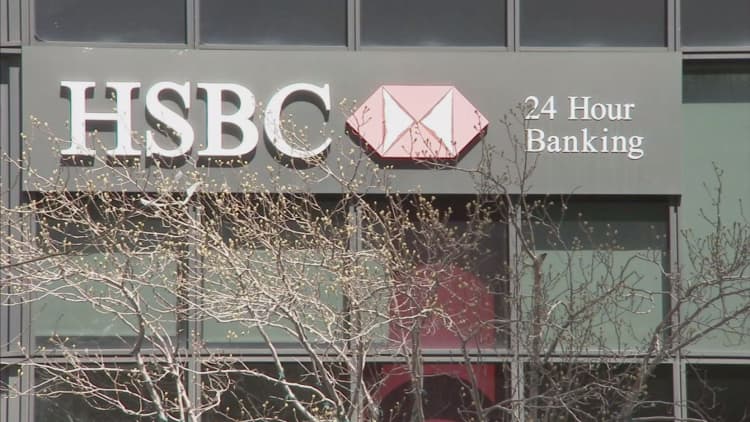
HSBC Holdings reported a 62 percent slump in annual pre-tax profit that fell way short of analysts' estimates due to one-time charges related to some businesses, and announced a new $1 billion share buy-back.
* 2016 pre-tax profit at $7.1 billion vs. $14.4 billion analysts' estimate
* Takes $3.2 billion impairment charge on Europe global private banking
* New buy-back takes total to $3.5 billion since H2 of 2016
Europe's biggest bank by assets said on Tuesday profit before tax for 2016 fell to $7.1 billion from $18.87 billion in the previous year. That compared with the average analyst estimate of $14.4 billion, according to Thomson Reuters data.
The bank's Hong Kong-traded shares fell about 3 percent following the release of the results.
The 2016 profit reflected a $3.2 billion impairment of goodwill in its global private banking business in Europe and the impact of its sale of operations in Brazil, the bank said in a statement to the stock exchanges. The private banking impairment charges mainly relate to its acquisition of Safra Republic Holdings in 1999, it said, without giving details.
"We have considered it appropriate to write off the remaining goodwill in the European private banking business," it said, adding the restructuring of global private banking is now largely complete.
The $1 billion share buy-back takes HSBC's announced buy-backs since the second half of 2016 to $3.5 billion following the bank's disposal of its Brazil unit in July last year in a $5.2 billion deal.
"We are investing over $2 billion in digital transformation initiatives to improve our offer to customers, and are instigating a further $1 billion buy-back programme reflecting the strength and flexibility of our balance sheet," Stuart Gulliver, group chief executive, said in a statement.
Speaking on CNBC's "Capital Connection" following the release of HSBC's earnings, Huarong International associate director Jackson Wong said the figures were disappointing.
"The bottom line is ugly... And only $1 billion buyback, I think that's a little bit stingy," Wong said.
"What these international banks are lacking is they could not find growth anywhere in the world. Sure, when you look at Latin America, it doubled because the base is very low. But when you look at Europe, Asian markets, they're not growing. So, I think HSBC should find some growth."
HSBC's shares have been among the best-performing European bank stocks since Britain voted in June to leave the European Union, climbing 53 percent against a 28 percent increase in the STOXX Europe index of 600 banks as the bank benefited from appreciation of the U.S. dollar and stronger capital levels.
The British bank, which has said it may move 1, 000 jobs to Paris following Britain's exit from the European Union, has said it had so far seen little impact from the referendum outcome on its business.
Douglas Flint, the group's chairman, struck an optimistic tone in a statement accompanying the results.
"The Group has improved its productivity, embraced technological change and continues to reinforce its standards of business conduct. It has a strong capital position and is gaining market share in important areas," he wrote.
"2016 will be long remembered for its significant and largely unexpected economic and political events. These foreshadowed changes to the established geopolitical and economic relationships that have defined interactions within developed economies and between them and the rest of the world. The uncertainties created by such changes temporarily influenced investment activity and contributed to volatile financial market conditions. Against this background, HSBC's performance in 2016 was broadly satisfactory," he added.
—CNBC contributed to this report.

